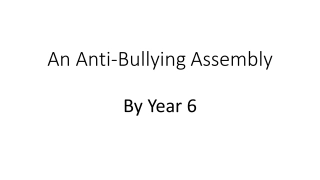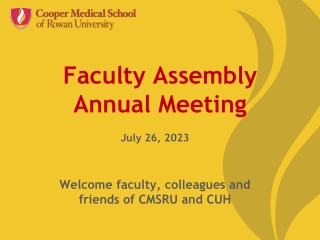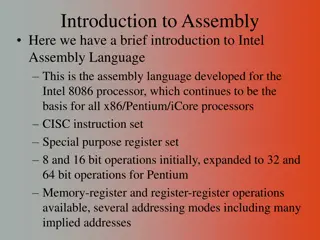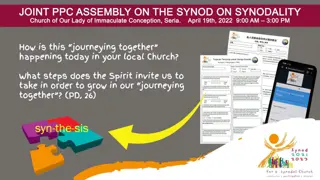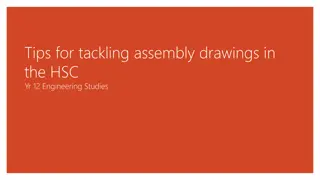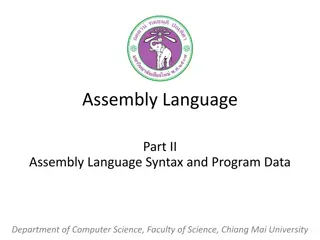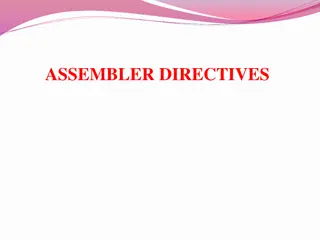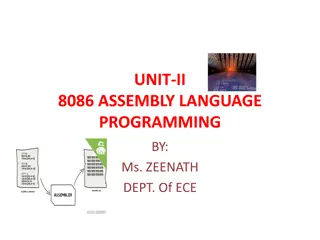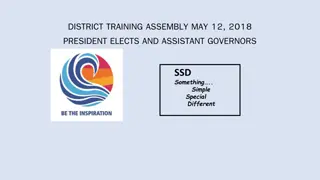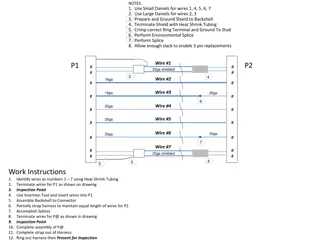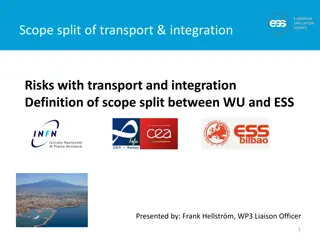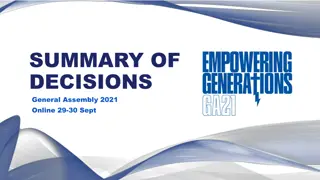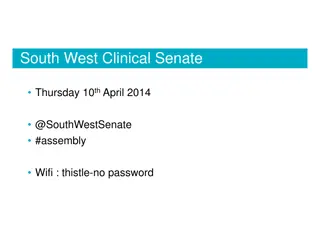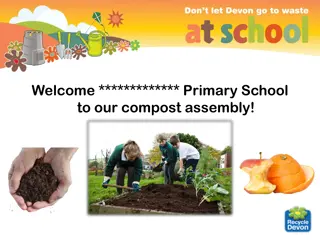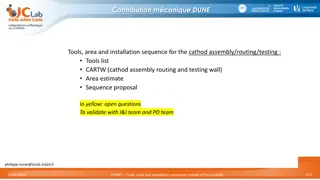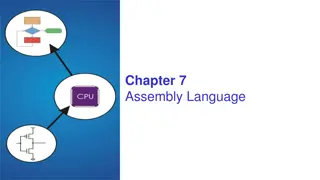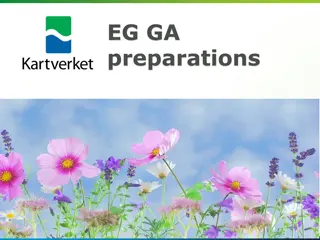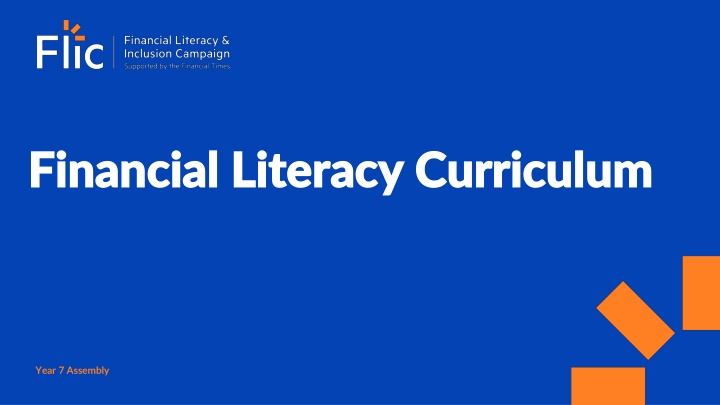
Financial Literacy and Inclusion Campaign by FLIC
Explore the importance of financial literacy through the Financial Literacy and Inclusion Campaign (FLIC). Learn about the cost of living crisis, inflation, government interventions, and public opinions on economic strategies.
Download Presentation

Please find below an Image/Link to download the presentation.
The content on the website is provided AS IS for your information and personal use only. It may not be sold, licensed, or shared on other websites without obtaining consent from the author. If you encounter any issues during the download, it is possible that the publisher has removed the file from their server.
You are allowed to download the files provided on this website for personal or commercial use, subject to the condition that they are used lawfully. All files are the property of their respective owners.
The content on the website is provided AS IS for your information and personal use only. It may not be sold, licensed, or shared on other websites without obtaining consent from the author.
E N D
Presentation Transcript
Financial Literacy Curriculum Financial Literacy Curriculum Year 7 Assembly
2 What is FLIC? What is FLIC? The Financial Times news group has set up a charity, Financial Literacy and Inclusion Campaign focused on building up the financial knowledge and skills of everyone in the UK, especially the people that don t usually come across this information. Flic have been working with Shoreditch Park to plan lessons that will improve your financial literacy.
3 Why is financial literacy important? Why is financial literacy important? Cost of Living Crisis: YOUR Questions Answered | Newsround #Newsround #costofliving #costoflivinginuk #explainer Welcome to the official BBC Newsround YouTube channel. Subscribe here . https://bit.ly/3bYidJ3 You may have heard lots of people talking about the cost of living crisis. The UK has seen the cost of food, fuel and energy go up, but the amount of money people are earning from their jobs isn't rising to the same level. BBC journalist and presenter Sean Farrington has been answering some of your big questions about what's been going on. The cost of living crisis. It's been all over the news and everyone seems to be talking about it - but why? You may have heard grown-ups talking a lot more about the price of things or you might have noticed changes in your life because your family is trying to save money. At the moment, the cost of food, fuel and energy just keeps going up in the UK, but the amount of money people are earning from their jobs isn't rising to the same level. This is what people are calling the cost of living crisis. The rising cost of things is known as inflation. That's when, over time, prices rise and how much you can buy with your money falls, so people want to be paid more in wages, which means it costs companies more to pay people to make things, which then pushes up how much they cost to make and the prices rise... and so on. There are lots of different reasons why prices have risen. It's partly down to an increased demand for fossil fuels like oil and gas which has meant energy prices have gone up. We don't just need energy for our homes - businesses also need energy to make their products, heat up offices and transport goods. There have also been shortages of goods like building materials and computer chips, which has created problems in the supply chain. All of this means a bigger cost for businesses which is then passed onto the customers - us! What's being done to help? Every year the government announces something called a budget, setting out its plans for the country's money. But last week, a 'mini' budget was released to try and help us out with the cost of living. Chancellor Kwasi Kwarteng, who's in charge of the UK's money, also announced some of the biggest tax cuts in 50 years. Adults pay tax on money they earn, and on things you buy, like food and drink. Taxes are one way the government can raise money to pay for things. What was announced in the 'mini' budget? Income tax - the tax on the money someone earns - will be reduced, so people have to pay less of what they earn to the government. National Insurance - also a tax on the money someone earns - has also been reduced. People on benefits should expect a rise in what they receive from April next year. People's energy bills shouldn't be going up by as much and they'll get a discount from the government from October. he government hopes that these plans will stimulate growth in our economy - in other words, if people have more money, they'll go out and spend it, which will make businesses richer and if they have less to pay in tax, they'll share their money around more. But not everyone's convinced the government's plans will help. What are people saying about the plans? In order to pay for these tax cuts, the government is going to be borrowing money and not everyone agrees with this strategy. Economists - experts who study information on how a country or region makes and spends its money - have said the plans would help the richest in our society more than the poorest. The Institute for Fiscal Studies - an organisation of experts who research the economy - said there was a chance the government's plans could work, but that it was also a big risk. After the 'mini' budget was announced, the pound started to fall. The pound sterling is the currency we use in the UK to buy and sell things. When our currency is worth less, it gets more expensive to buy from other countries. Please visit www.bbc.co.uk/newsround/13865002 for tips about what to do if you are feeling sad about what you've seen, heard or read. We have everything for an inquisitive mind do you want to know what s going on in the world? Complex stories explained in a way that makes sense to you? Well, you re in the right place! At Newsround we bring you news stories which are affecting you and hear your opinion, the latest trends, movie reviews and what you re doing to help each other and the environment. Want top tips on the latest video games? Want to know more about what s going on in the world of sport and music? Then you re in the right place. Why not sit back, enjoy and don t forget to subscribe so you never miss one of our videos. To watch the daily bulletins head to the BBC iPlayer and to get involved with votes and have your say on a news story head over to the Newsround website https://www.bbc.co.uk/newsround For daily news bulletins visit the BBC iPlayer https://www.bbc.co.uk/iplayer/episodes/b006mdbc/newsround
4 Why is financial literacy important? Why is financial literacy important? We have been hearing about the cost of living in the news. Due to national and international changes, many families are experiencing difficulties with their finances. We want to make sure that you are equipped with the knowledge and skills that can help you to prepare and protect yourself financially in the future.
Having a respectful learning environment 5 Money is a very personal topic. People have different values about money and this might be influenced by their circumstances. During your financial literacy lessons, there are some important expectations for keeping our learning environment safe and respectful. In every lesson; We will listen to each other respectfully We will avoid making judgements or assumptions about others We will comment on what has been said, not the person who has said it We won t put anyone on the spot and we have the right to pass We will not share personal stories or ask personal questions
Every child should have a laptop. Do you agree? You have two minutes to discuss your opinion with the person next to you. You must give a reason to support your argument. Even better if you have examples.
Every child should have a laptop. Do you agree? Some people would say that a laptop is a luxury or a want and you can live without one. Other people would say that a laptop is a need, especially after 2020 where we had to adapt to the pandemic and learn and work from home. How does this link to money? Knowing the difference between a need and a want is one of the first steps to thinking about how you can spend your money wisely. This will be the topic of your first financial literacy lessons.
What will you be learning? 8 You will have six lessons on how to make financial decisions How to look after your monthly money Session 1 Session 2 Session 3 Session 4 Session 5 Session 6 Decision making task- Budgeting for a holiday Spending decisions The impact of inflation Being a critical consumer How to budget Getting a job Don t forget your calculator!

